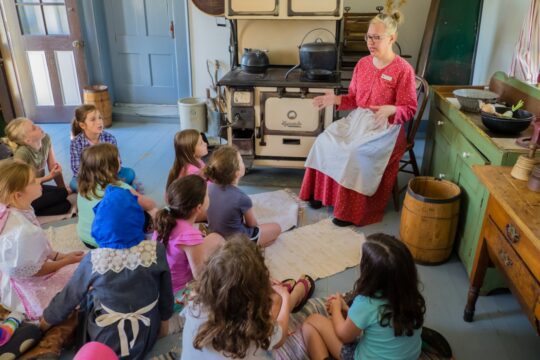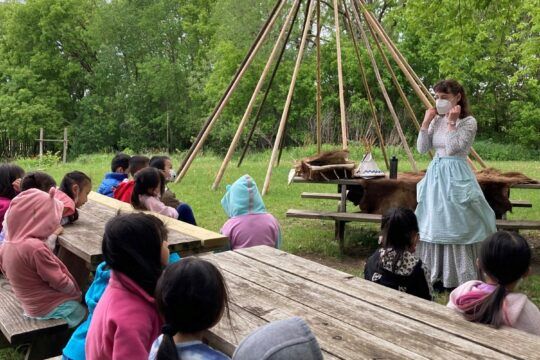Pioneer Field Trip

Learn about the Day-to-Day Life of Jane Gibbs and her Family
This tour, offered May through October, introduces the story of Jane Gibbs and focuses on early farmstead life in Minnesota and includes stations designed to be a timeline of events. These include the replica sod dugout and animals, the Farmhouse Original Room and Victorian-Era Parlor, bed chambers and Farm Lab, Summer Kitchen, one-room schoolhouse, and candle dipping hands-on activity. This tour is recommended for first grade and up. Details on adding a Dakota tour to this field trip experience is outlined below. All Gibbs Farm staff have passed a State of Minnesota background check.
Winter Field Trips: We now offer a version of the Pioneer field trip during the winter (November-March) for groups of up to 50 students! Learn what school was like in a one-room schoolhouse, make and try butter, and complete a fabric quilt-square craft. See pricing information below. This tour is recommended for first grade and up. A Dakota tour option is also available, see the Dakota Field Trip page for details.
Pricing and Timing
Regular Season (May-October): Allow two hours. Price: $8/student. School staff are free of charge as well as two parent chaperones per classroom. Additional parent chaperones pay $8. Schools are invoiced after the field trip.
Winter Season (November-March): Allow 90 minutes. Price: $8/student. School staff are free of charge as well as two parent chaperones per classroom. Additional parent chaperones pay $8.00. Schools are invoiced after the field trip.
Homeschool Groups Chaperones: All adults pay $8.
Free & Reduced Lunch Rate: Schools that have 50% or more students eligible for free and reduced lunch, rate is $2 less ($6 for 2-hour tour, $10 for 4-hour).
How to Book
Fill out our field trip interest form or reach out directly to our Site Manager, Sammy Nelson. Please note that field trips are not confirmed through the field trip interest form.

Add a Dakota Tour to your Visit
Schools and groups may opt for both a Pioneer and Dakota tour on the same day (May-October). This includes the Dakota and Pioneer tours as described, one hands-on activity (candle dipping or beaded bracelets), and a ½ hour lunch break (bring bag lunches). Allow four hours. Price: $12.00/student. (See above for teacher and chaperone pricing). These tours are recommended for first grade and up.
About the Academic Standards
The Gibbs Farm Pioneer Field Trip meets the following Minnesota State Education Standards.
Grade 1 Standards Met
1.1.1.1.2 The Nature of Science and Engineering: Recognize that describing things as accurately as possible is important in science because it enables people to compare their observations with those of others.
1.1.3.2.1 The Nature of Science and Engineering: Recognize that tools are used by people, including scientists and engineers, to gather information and solve problems.
1.3.1.3.3 Earth and Space Science: Identify and describe large and small objects made of Earth materials.
1.4.1.2.2 History: Describe how people lived at a particular time in the past based on information found in historical records and artifacts.
1.4.2.4.1 History: Compare and contrast family life from earlier times and today.
1.4.2.4.2 History: Compare and contrast buildings and other technologies from earlier times and today.
Grade 2 Standards Met
2.1.2.2.2 The Nature of Science and Engineering: Describe why some materials are better than others for making a particular object and how materials that are better in some ways may be worse in other ways.
2.1.2.2.3 The Nature of Science and Engineering: Explain how engineered or designed items from everyday life benefit people.
2.2.3.5.1 Economics: Classify materials that come from nature as natural resources (or raw materials); tools, equipment, and factories as capital resources; and workers as human resources
2.3.4.9.1 Geography: Identify causes and consequences of human impact on the environment and ways that the environment influences people.
2.4.1.2.1 History: Use historical records and artifacts to describe how people’s lives have changed over time.
Grade 3 Standards Met
3.1.3.2.1 The Nature of Science and Engineering: Understand that everybody can use evidence about the natural world, identify patterns in nature, and develop tools.
3.3.1.1.1 Geography: Use maps and concepts of locations (relative location words and cardinal and intermediate directions) to describe places in one’s community, the state of Minnesota, the United States, or the world.
3.4.1.1.1 History: Reference different time periods using correct terminology, including the terms decade, century, and millennium.
3.4.1.2.1 History: Examine historical records, maps, and artifacts to answer basic questions about times and events in history, both ancient and more recent.
Virtual Field Trip Options Available
Can’t attend a field trip in-person? We offer virtual field trip experiences too!